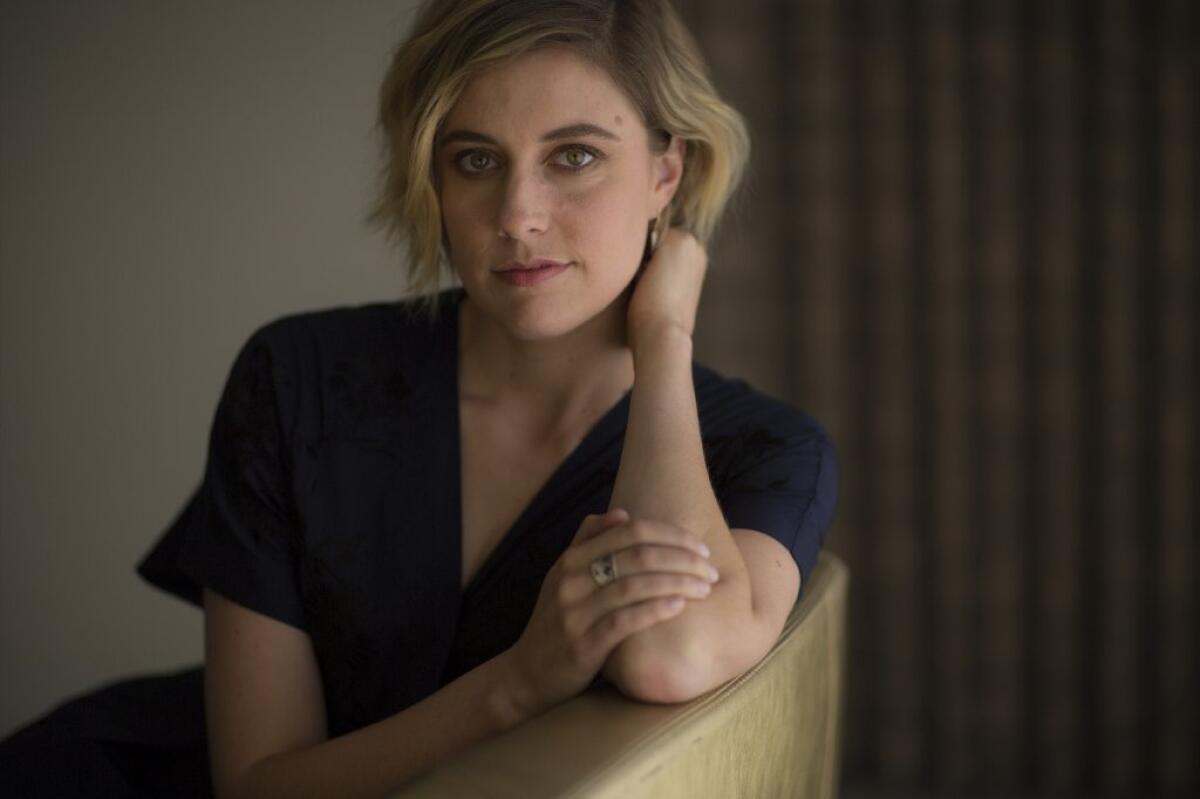Greta Gerwig visits the â60s and â70s in her new films — and is glad she didnât live them

Greta Gerwig is visiting Beverly Hills from her New York City home to talk about her roles in two major films this season, âJackieâ (directed by Pablo Larrain), in which she plays Jacqueline Kennedyâs lifelong friend and social secretary, Nancy Tuckerman, just after the assassination of President Kennedy in 1963, and the punk-loving art photographer, Abbie, a cervical cancer survivor in 1979 Santa Barbara in Mike Millsâ â20th Century Women.â
Her two vibrant yet distinct supporting characters in two wildly different time periods delighted the tall, erudite (her Barnard degree was in philosophy) actress: âI love learning about the â60s and â70s and all that went on during that period, but Iâm also glad I wasnât living in a world when the expectation is I get married and shut the ... up,â she laughs in all seriousness.
Both âJackieâ and â20th Century Womenâ are set in transitional years in American culture; 1963 and 1979 respectively. Was this just a coincidence?
A complete coincidence. I did them back to back â â20th Century Womenâ first and then âJackie,â that way I was going backwards in time. Interestingly, both films were about strong women but what a dichotomy. I mean, just look how different the women looked and acted in these periods and theyâre only 15 years apart. Itâs amazing how much the expectations for women changed in those few years.

âJackieâ follows First Lady Jacqueline Kennedy, played by Natalie Portman, after the assassination of President John F. Kennedy.
The two characters could not have been more different. How did you experience that dichotomy?
Both to me felt distinct and unique and were parts that I hadnât done previously, though each of them were based on real people. Iâd also never done either time period. What I found fascinating was that in âJackieâ the women were still of the generation where you could really only get as far as your husband; if you had any ambition or intelligence your best bet was to attach yourself to a man who could allow your life to be interesting. And even though Dorothea [Annette Bening in â20th Century Womenâ] was of the same Depression-era, she was so totally opposite to that.
What was the key, then, for you in playing Nancy Tuckerman in that earlier time?
Nancy and Jackie knew each other since they were 5 years old, they grew up together and Nancy â who is still alive â worked her whole life for Jackie; she wrote the press release when Jackie died. And she never wrote a book or gave an interview; she was so silent, and that kind of loyalty felt like from another time. It felt like that kind of absolute love and devotion was the way to play her.
Abbie also had a similar relationship with Dorothea in a way ...
Yes, in both films I felt like I had this almost worshipful relationship with the women. When Abbie first sees Dorothea when she walks in that house to rent a room and finds her in her workerâs jumpsuit and this total freedom, it opens up a world to Abbie, who is from this conservative Santa Barbara country-club, cocktails at 4, the-slow-death-of-happiness-that-is-not-happiness. Itâs almost like Dorothea was this saving angel for her.
I understand during â20th Centuryâ costume fittings you all danced?
The designer had a stack of records for each character and we got to play the music. Mike let us each bring in a song we thought represented our character â which for Abbie was âFound a Jobâ by Talking Heads â and then weâd all have to dance as a group to it. We did this every day. It was such a good exercise because you instinctively couldnât feel embarrassed because itâs vulnerable and itâs broad daylight dancing in a room together. It was extraordinary and it made us all really, really close.
Do you see any connections between the eras of these films and current day?
Because I didnât live through either, when I think of say, the 1970s I think of the best of the â70s â the great American cinema, music, art. But the truth is there was a lot of crap in the â70s; Iâm cherry-picking the parts I like best. I think time periods are like a rubber band and you stretch things [to get freedom] and then it snaps back. Itâs really only in retrospect you have a sense of what the moment was about and that snap. It just feels like a scary mess while youâre going through it.
See the most read stories this hour Âť
More to Read
From the Oscars to the Emmys.
Get the Envelope newsletter for exclusive awards season coverage, behind-the-scenes stories from the Envelope podcast and columnist Glenn Whippâs must-read analysis.
You may occasionally receive promotional content from the Los Angeles Times.










